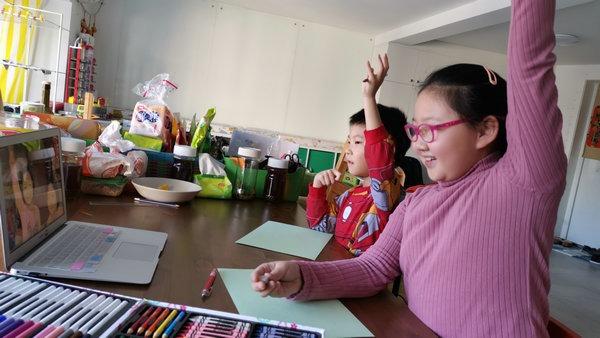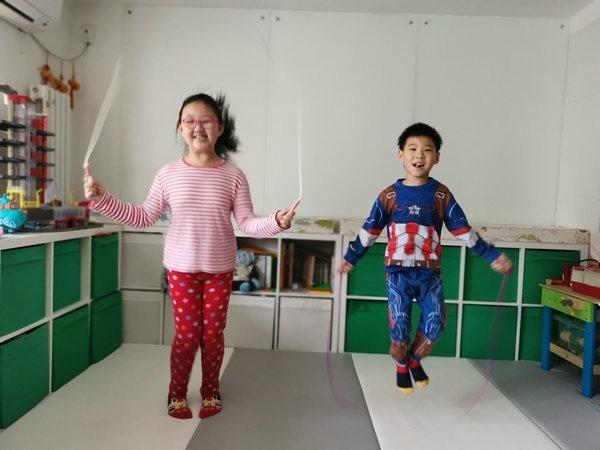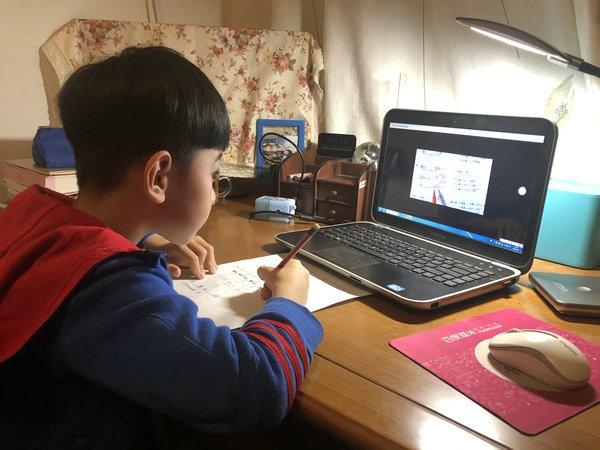It's "going to school" but not as we know it. Every morning when Zhu Jinhao, 8, turns on the TV set in Shiyan, Hubei province, his parents and grandparents quickly walk into their bedrooms and try to be as quiet as possible.
 Yang Junyi, 8, and her brother Yang Junyue, 6, jump ropes during a break, and they attend a livestreamed art class. (PHOTO PROVIDED TO CHINA DAILY)
Yang Junyi, 8, and her brother Yang Junyue, 6, jump ropes during a break, and they attend a livestreamed art class. (PHOTO PROVIDED TO CHINA DAILY)
The adults are not spoiling the child by giving him unfettered access to TV. Instead, it's time for the second-grade pupil to digitally "attend class". This routine is part of unprecedented lifestyle change, being replicated in households all over China, due to the novel coronavirus outbreak.
A digital education program provided by the Hubei Provincial Department of Education delivers a comprehensive array of classes which mostly begin at 9 am and conclude around 3:30 pm or later
Usually, the winter break ends in mid-February, followed by a new semester and a flood of students back to schools.
But with the epidemic yet to be completely contained, Hubei province, the most seriously affected region in China with its capital city Wuhan at the epicenter of the outbreak, has launched distance education for primary and middle school students as a substitute for on-site learning, which began on Feb 10.
ALSO READ: Medical staff draw picture of hope at Wuhan hospital
A digital education program provided by the Hubei Provincial Department of Education, which is available on the provincial television channels, as well as online platforms, delivers a comprehensive array of classes which mostly begin at 9 am and conclude around 3:30 pm or later, depending on the respective grades, according to local media outlets.
Aside from Hubei province, most municipalities, provinces and autonomous regions in China have provided similar digital classes for students at home, exemplified by Beijing from Feb 17 and Shanghai since March 2.
For most parents, online classes are an effective aid to help children establish a good daily routine, but they are also worrying that watching digital screens for a long time may harm their eyesight.
As a compromise, a number of parents in urban areas have tried their best to improve the e-learning environment, in some cases by installing projectors or using TV sets which have bigger screens than iPads and smartphones.
"Since Xiaobao (Jinhao's nickname) has started online classes, we have transformed the living room into his study room and adjusted our bedrooms to be working places," says Yang Yan, Jinhao's mother.
A 37-year-old manager of a local furniture shopping mall, Yang, alongside her husband and their son, visited her parents on Jan 24, Lunar New Year's Eve. But the abrupt lockdown of Shiyan, 450 kilometers from Wuhan, kept her with her parents, unable to return home to another neighborhood in Shiyan.
 Yang Junyi, 8, and her brother Yang Junyue, 6, jump ropes during a break, and they attend a livestreamed art class. (PHOTO PROVIDED TO CHINA DAILY)
Yang Junyi, 8, and her brother Yang Junyue, 6, jump ropes during a break, and they attend a livestreamed art class. (PHOTO PROVIDED TO CHINA DAILY)
On Feb 10, the local government announced that the Zhangwan district in Shiyan, which has a population of more than 410,000 residents, would launch China's first wartime control order for better containing the spread of the outbreak.
"There are seven apartment buildings in my mother's community, and each has volunteers on supervising duty to guarantee residents do not venture outside. We purchase our daily necessities online and will be notified when to fetch them at the scheduled time," says Yang.
When the new semester kicked off digitally, Yang soon realized that the biggest problem was that she couldn't go out to get to a printer.
"My son's teachers are strict and demanding. They assign a lot of homework every day. Without a printer, adults, including my father, spend a lot of time noting down the homework requirements," she says.
After getting permission to leave the building, Yang finally brought a printer home in late February.
"It makes me feel much better. All the teachers are very responsible. Even in quarantine, they want the children to get the best education," she says.
A battlefield for all
Different from Hubei province, listed as one of the best performing provinces in terms of gaokao (national college entrance exam) scores, some cities and regions which have launched online classes for pupils haven't strictly required them to follow daily courses.
But for parents who simultaneously cope with office tasks and supervise home-schooled children, life is still stressful and nerve-wrecking, like a "battlefield".
Some comic photos and videos made by exhausted parents have been widely viewed online. For instance, a housewife complains she has to play multiple roles now, including "a chef, a nanny, a secretary (for her working-at-home husband), and an assistant teacher as well as a classmate of her child".
Liu Chang, an agent for artists in Beijing, says she has no free time since she has to take care of her daughter Yang Junyi, 8, and her son Yang Junyue, 6, as well as working at home. Her husband, an employee of an airline company, also works at home.
Liu's daughter Junyi is a second-grade pupil at the private Beijing Zhongde School, which hasn't taught new content since the digital start of a new semester but assigned homework, based on new textbooks, every day.
"My husband and I felt a bit anxious the first night when receiving the notice," says Liu. "It's perhaps a bit difficult to count on an 8-yearold child to study attentively and understand new textbooks by herself, so we have to partly take over the teacher's job."
From purchasing a printer and self-learning primary school textbooks to checking homework, Liu says she and her husband are now responsible for making sure that different subjects are studied, which takes several hours each day.
 Zhu Jinhao, 8, studies maths in a class at home in Shiyan, Hubei province. (PHOTO PROVIDED TO CHINA DAILY)
Zhu Jinhao, 8, studies maths in a class at home in Shiyan, Hubei province. (PHOTO PROVIDED TO CHINA DAILY)
The parents also urge their children to exercise, with skipping ropes and situps.
The family's daily schedule is jampacked.
"Every morning when my husband is cooking breakfast, I'm working on chopping vegetables and meat to ensure lunch can be cooked quickly," says Liu.
On the busiest days, Liu has to handle a lot of work and she feels pangs of guilt about not being able to "be a parent".
"My children have got used to seeing their parents consistently on telephone calls," says Liu.
The good news is that she found her children to be more capable and understanding after experiencing the crisis.
"They are growing up faster. I'm so proud that they are now more independent and hardworking," she adds.
Among hundreds of thousands of primary and middle school teachers, many have to take care of their own children at home, as well as recording online classes.
Some teachers are also facing an unprecedented challenge.
Hai Na, a Chinese literature and language teacher at Beijing No 15 High School, says she has learned a lot of online teaching skills from her colleagues.
Now responsible for two classes of sophomores, each with around 30 teenagers, Hai has worked diligently on preparing diverse content. This ranges from figuring out a theme for students to discuss online-such as brainstorming ancient poems about snow-to teaching classics, including French novelist Victor Hugo's The Hunchback of Notre-Dame.
READ MORE: Films reel from virus
Mother to a 2-year-old son, Hai is frequently interrupted by the toddler. One day when she was livestreaming an online class, the boy suddenly ran into her room and chanted nursery rhymes, to laughter from Hai's students.
On advice from her fellow teachers, Hai now records classes in advance, when the boy is sleeping.
"I'm missing the days of teaching my students face-to-face," says Hai.
Contact the writer at xufan@chinadaily.com.cn


